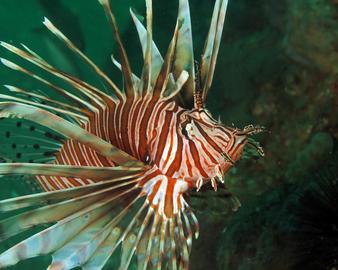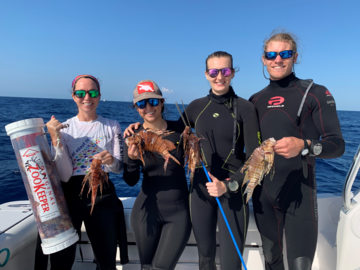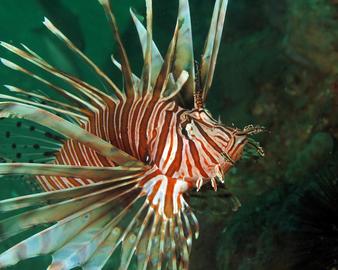Current search
Search found 427 items
- INVASIVE
WHAT:
REEF, the Reef Environmental Education Foundation, will host a free educational presentation and discussion about the recent invasion of Atlantic waters by Indo-Pacific lionfish. Though no confirmed sightings have been made in the Florida Keys, the fish have become established along the U.S. east coast, Bahamas and Bermuda and are moving rapidly throughout the Caribbean.
Join REEF staff Dr. Alli Candelmo for an update on current research findings of the invasive lionfish in the Tropical Western Atlantic.
[Originally scheduled for Wednesday, December 4th, 2019, but rescheduled due to Presenter illness]
In this early paper, staff from REEF and NOAA studied feeding ecology of the invasive lionfish (Pterois volitans). The authors collected stomach content data from fishes taken throughout the Bahamian archipelago. Three relative metrics of prey quantity, including percent number, percent frequency, and percent volume, were used to compare three indices of dietary importance. Lionfish largely prey upon teleosts (78% volume) and crustaceans (14% volume).
This article highlights some of the ways that the Upper Keys community has adressed the invasive lionfish, including REEF's 8th Annual Earth Day "Locals" Lionfish Derby held on April 23-25, 2021 in Key Largo.
Learn how to safely conduct lionfish removals by attending a REEF Invasive Lionfish Collecting & Handling Workshop.
Workshops include a classroom portion that covers background on the invasion, lionfish biology, ecological impacts, current research, and collecting and handling techniques. After we wrap up the classroom portion of the workshop, we will head out to the water for a 2-tank dive to put our skills to work.
The impacts of invasive lionfish (Pterois volitans/miles) on native coral reef populations in the Western Atlantic Ocean and Caribbean Sea can be enormous. However, how much lionfish differ from native predators and whether their effects outweigh the abundant mesopredators that occupy many reefs invite continued examination. The authors of this paper present empirical evidence from Caribbean Panama and beyond, suggesting that lionfish are less abundant than native mesopredators (e.g. small seabass).
The article highlights Team Forever Young's participation in the 2022 REEF Earth Day Lionfish Derby, where they collected a record 426 invasive lionfish in one day.
The authors of this study examined drivers of public involvement and success at invasive removal in tournaments (derbies) to catch Indo-Pacific lionfish (Pterois volitans/miles) in the Western Atlantic. Information on 69 lionfish derbies held in the wider Caribbean region from 2010 to 2015 was compiled, including REEF Lionfish Derbies. The authors found that the number of lionfish caught increased with effort and with time since lionfish were established in an area.
Join REEF staff Dr. Alli Candelmo for an update on current research findings of the invasive lionfish in the Tropical Western Atlantic.
This paper examined the genetic source of the invasive Indo-Pacific lionfish in the Bahamas. Many of the samples used in this study were collected during REEF's lionfish research trips during 2007 and 2008. Two species, Pterois volitans and P. miles, were well established along the United States east coast before the first lionfish were reported from the Bahamas in 2004, where they quickly dispersed throughout the archipelago by 2007.



